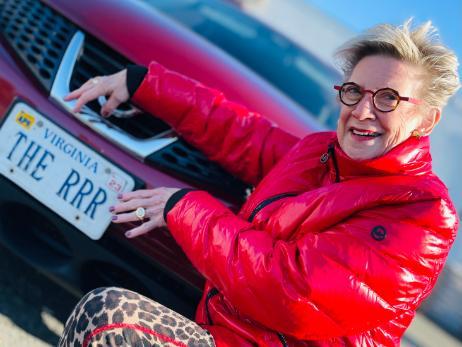PD patient ‘making a difference in the world via VCU’

Gabie Frazier hasn’t let Parkinson’s disease slow her down. If anything, it’s sped her up.
Before she retired in 2017, her colleagues at the Virginia Department of Education would periodically notice her left hand shaking. They encouraged her to seek medical attention; finally,she scheduled an appointment. After months of testing and observations, she was diagnosed with the mild stage 1 of Parkinson’s disease in March 2017.
“The news was foreign and unbelievable, and I didn’t want to share this diagnosis with anyone,” she said. “Not knowing how family members, friends, and colleagues would react to the news, extreme caution was generated on my part. Would I be shunned, be labeled as contagious, or be greeted with opened arms?”
At a “young 77,” Gabie stays busy with volunteerism for organizations around Richmond. She serves numerous nonprofits and has a passion for making floral arrangements. You may catch her zipping around town in her red Nissan Juke.
Gabie takes Carbidopa-Levodopa four times a day and additional medication at bedtime to control pain in her legs and tremors on the left side of her body. She has maintained PD’s initial stage. Save a visible shake in her hand from time to time, one would never know she’s living with an incurable, progressive disease. But the fact there’s currently no cure is something she wants to change.
Through her relationship with VCU, she’s directed her estate to the VCU Parkinson’s and Movement Disorder Center to grow its research and training capabilities. “I am going to try to make a difference in the world through VCU,”
Gabie says. She feels a special bond to VCU as a patient of Leslie Cloud, M.D., and the entire team at VCU Neurology (Gabie is also a graduate of the former Richmond Professional Institute, which became VCU, and later earned a master’s degree at VCU). “Whatever I have when ‘It’s curtains’ is designated for VCU,” she says, “even if it’s only $1.95.”
She also espouses the need for the patient-centered care she and other PD and movement disorder patients get at VCU. “Unless you have a relationship with a caring and compassionate medical individual that relates to the patient, the quality of care will be ineffective,” she says. “As a patient, I’m placing my trust and faith in the specialist to provide a responsible plan of action aligned with the diagnosis.
Without patient-centered care, neither the patient nor the specialist will win.”
What does the future hold for Gabie? “Our growth and our survival depend upon our willingness to give to each other,” she says. “I can truly say, my Parkinson’s has embellished my passion for loving, growing, accepting, learning, empathizing, making a difference, and giving. Each day is celebrated in anticipation of tomorrow’s cure.”